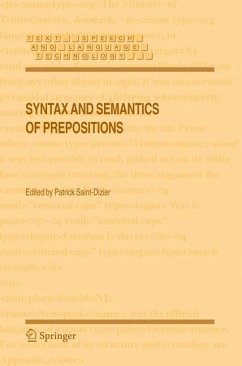This book is the first to provide an integrated view of preposition from morphology to reasoning, via syntax and semantics. It offers new insights in applied and formal linguistics, and cognitive science. It underlines the importance of prepositions in a number of computational linguistics applications, such as information retrieval and machine translation. The reader will benefit from a wide range of views and applications to various linguistic frameworks, among which, most notably, HPSG. The book is for researchers working in the fields of computational linguistics, linguistics, and artificial intelligence.
Dieser Download kann aus rechtlichen Gründen nur mit Rechnungsadresse in A, B, BG, CY, CZ, D, DK, EW, E, FIN, F, GR, HR, H, IRL, I, LT, L, LR, M, NL, PL, P, R, S, SLO, SK ausgeliefert werden.









